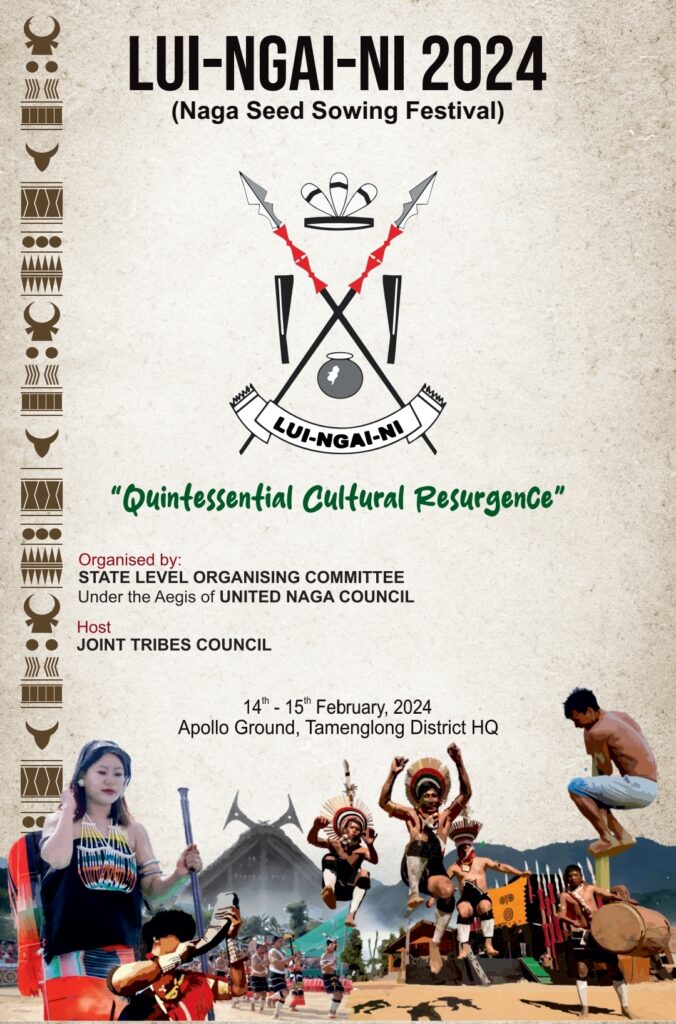EKHON | UKHRUL: Lui-ngai-ni, Naga Seed Sowing Festival 2024 is all set to celebrate on 14th and 15th February under the theme ‘Quintessential Cultural Resurgence’ at the Apollo Ground, Tamenglong district headquarter. Lui-ngai-ni is a major festival celebrated by Naga tribes of Manipur to celebrate brotherhood and to mark the beginning of new season. The two-day festival will be hosted by Joint Tribes’ Council (JTC).
The State Level Organizing Committee under the aegis of United Naga Council (UNC) said;
“The need to re-formulate a comprehensive conceptual cultural frame-work in the emerging situation and context of globalization cannot be overlooked. Of course, culture is a system of conventions, laws and practices that are consciously or unconsciously framed by a group of people to regulate their socio-economic politico-religio activities. It has material and immaterial aspects attached to it, and both play a pivotal role in the conduct of an individual or a collection of individuals in a society, and also play an intrinsic role in the formation of a people’s identity.

Nagas, in general, are community oriented and the individuals gain community recognition, respect, adulation, and status depending on his contributions to society. An individual’s identity is determined by one’s participation in a society’s culture and devoid of it, his identity is at stake. An individual may also be stripped of his identity if his actions contravenes the established customary and traditional practices. It is in this context that culture has played a prominent and significant role in shaping and molding an individual’s and society’s identity. Seed sowing festival or festival of merit, etc. are cultural practices prominent amongst the Nagas. These festivals have both material and immaterial aspects attached to it. The festival of merit demands a lot of hard work, determination, sacrifices, benevolence, goodwill, etc to perform it. The givers magnimously give to his villagers, friends and neighbours without expecting any reciprocal material benefits from his fellow men, demonstrating that Nagas prioritise the greatest good of the greatest number of people over an individual’s material prosperity. The performers of such festivals are given social recognition, status and goodwill of the participants. Seed sowing festivals are performed by all the Naga tribes to offer gratitude and praise to the almighty for the bountiful blessings in the year past and invoking upon Him to continue showering His blessings on the villagers in the coming seasons.
These activities of identity formation, reliance on and supplication to the Almighty, emphasise on cardinal moral values etc. have of late been relegated to the background and individualism, consumerism, capitalism have taken centre stage, resulting in degeneration of moral and cultural values. The reasons for such a state can be traced to the proselytizing of the Nagas, Christianity per se is not responsible for the degradation but the ignorance of the western teachers has contributed to our cultural decadence. Our interactions with the outside world or “the other” first with Meiteis and Ahoms, next the Britishers and our subsequent meeting with the Indians have had almost distorted our understanding of ourselves and culture. Modern education has, in spite of its various positive contributions, had a huge impact on the worldview of the Nagas as it is responsible for introducing multiple and contradictory worldviews to our society, leading to our cultural corrosion and dilution, thereby impacting our identity.
Our Naga society is now confronted with these multiple issues, which need immediate attention and determined conscious intervention to reclaim our past glory, reconstruct our culture and reorganize ourselves on the basis of democratic, humanitarian and Christian cardinal values and principles to establish a just society. This endeavour must synthesize both the socio-cultural ethos, values and practices with the cardinal principles and teachings of Christianity so as to evolve a dynamic relationship between culture and religion. The process of synthesis has been initiated by various people but it still lacks a coherent conceptual framework, which has resulted in relegating culture to the background. Such an exercise demands a conscious determined concerted effort from all stake-holders making the intellectual appropriation of our cultural values, principles and practices a basic necessity. The lack of this exercise exposes us to the danger of cultural assimilation and dilution or loss of our identity by the more pervasive and dominant cultures. Thus risking being uprooted from the moorings of our cultural ethos as our land is presently flooded with foreign cultures.
It is in response to this imminent threat and the basic necessity of protecting, preserving and promoting our culture that UNC initiated a consultation with all Naga tribes in South Nagalim and the nomenclature “Lui-Ngai-Ni” was christened in 1986 and a collective Naga seed sowing festival was organized on the 15th February, 1987 and every year since then. This day is officially recognized and declared a state Holiday by the government of Manipur in 1988, and the Ministry of Tourism, Government of India listed lui-ngai-ni as one of the tourist festivals of India in 1997.
Therefore, to protect, preserve and promote our culture and corollarily our identity, we must persevere in reclaiming our socio-cultural ethos and practices and blend it consistently with Christianity. We must reconstruct a socio-cultural-religio body of knowledge to make it relevant and applicable in our christianized society. We must emphasise imparting moral standards amongst our youths. The immaterial virtues associated with such cultural events should be emphasized and practiced. It is in this context that the theme, “Quintessential Cultural Resurgence” is adopted. May it rekindle our love for our culture.”
